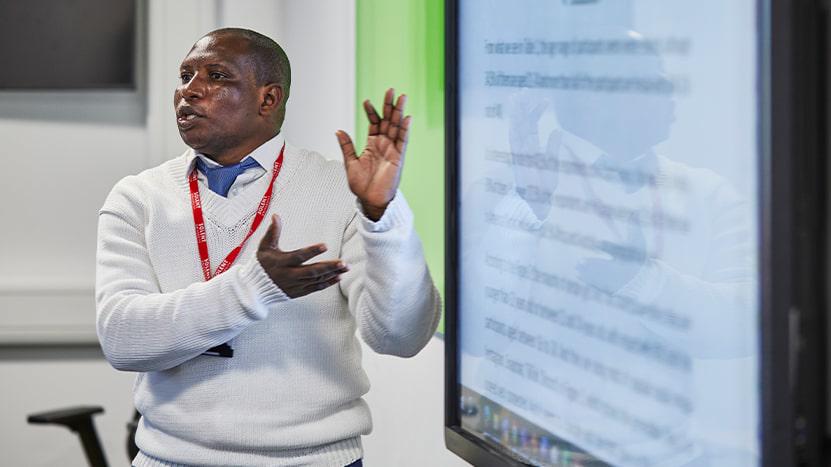MScSoftware Engineering
Apply direct
- 1 year full-time
- 1 year full-time with placement
- 2 years part-time
Why study a software engineering master's degree at Solent University
Master software engineering from the ground up with expert teaching; hands-on projects; and coverage of AI, programming, emerging tech, and cyber security to launch your global tech career.
- £0minvested in our campus estate and facilities in the last five years
- 0%of our master’s graduates progress to high-skilled careers or further study (Graduate Outcomes Survey 22/23, FT taught master's)
- £0kmedian salary for our master’s graduates (Graduate Outcomes Survey 2022/23, taught master's)
- Gain hands-on experience through projects that reflect current industry needs.
- Develop critical thinking and creative skills to address tomorrow’s tech challenges.
- Choose from areas like AI, emerging technologies, and cyber security, preparing you for today’s job market.
- Learn to articulate complex ideas and work ethically in diverse teams.
- Stay ahead in the fast-paced tech world by continuously adapting to new methodologies and technologies.
- Bridge the gap between academic learning and real-world industry practices with practical, applied knowledge.
Any questions?
Contact international admissions
Email: Call:Course overview
The MSc Software Engineering programme is specifically designed to provide you with the skills employers are actively seeking. Throughout the course, you'll gain a robust technical foundation in core areas such as programming languages, software design, algorithms, and system architecture, while also developing specialised expertise in areas like artificial intelligence, cloud computing, and cyber security. By combining both theoretical knowledge and practical experience, this course prepares you to meet the technical demands of the industry.
Beyond technical proficiency, employers highly value problem-solving, teamwork, and adaptability - skills that are central to the curriculum. You'll work on real-world projects, collaborate with peers, and hone your critical thinking and communication skills - all of which are essential for excelling in the workplace. The programme also places emphasis on ethics and professional responsibility, ensuring you're equipped to tackle the ethical challenges that arise in the development of software.
With this focus on both industry-relevant expertise and professional ethics, you'll be prepared to thrive in a rapidly evolving technology landscape. The course’s emphasis on lifelong learning also ensures that you remain adaptable to emerging technologies throughout your career.
The course also provides an opportunity for students to take an industry placement after completing the taught modules and the dissertation. The placement could be anywhere between 13 and 26 weeks.
This course is for
This course is designed for individuals who are passionate about transitioning into the tech industry, regardless of their academic background. Whether you come from a non-technical field, such as business, arts, or humanities, or a related discipline without a strong programming foundation, this course will equip you with the essential skills to excel in software development.
It is ideal for those seeking a career change into the fast-growing field of software engineering or anyone wishing to enhance their technical expertise and apply it to real-world challenges. If you are eager to build a solid foundation in programming, software design, and development methodologies, while developing a deep understanding of emerging technologies like AI, cybersecurity, and cloud computing, this programme is the perfect opportunity to start or accelerate your career in technology.
What this course leads to
By the time you graduate, you'll have a strong portfolio of practical skills and experience in tackling industry-relevant problems. With this skill set, you will be prepared to step into a wide range of in-demand roles, such as:
Meet the team
The University cannot guarantee any particular members of staff will teach specific aspects of the course in the future, but will endeavour to ensure the teaching team maintains their balance of experience and qualifications.
Facilities
This course makes full use of state-of-the-art facilities and equipment to support hands-on learning and research. Students will have access to advanced computing labs equipped with powerful computers, high-performance servers, and the latest software development tools, including IDEs (Integrated Development Environments), version control systems, and industry-standard collaboration tools.
These resources, combined with collaborative workspaces, ensure that students have the necessary tools for both individual study and collaborative, industry-relevant projects.
What you'll study
Core modules
Computer Fundamentals and Problem Solving (30 credits)
This module introduces foundational concepts of core principles and practices of computer fundamentals and problem solving. During the module, you'll cover the basics of computer architecture, knowledge of operating systems, introduction to networking and cyber security, and programming.
Software Design and Architecture (30 credits)
This module provides a deep dive into the principles of software design and architecture, essential for developing scalable and maintainable software systems. You'll explore architectural patterns, design methodologies, and requirement engineering processes, including the gathering, analysis, and documentation of software requirements. You'll also delve into agile methodologies and their role in software development.
Web and Mobile Application Development (30 credits)
This module focuses on developing applications for the web and mobile platforms and provides an introduction to databases and their role in storing and retrieving data for web applications. During the module, you be introduced to foundational concepts and tools used in web and mobile application development, focusing on creating responsive and interactive designs, equipping you with the basic skills to design and prototype applications using modern frameworks and technologies.
Emerging Technologies in Software Engineering (30 credits)
This module delves into the latest advancements in software engineering, emphasising the integration of machine learning (ML) and artificial intelligence (AI) within the software development lifecycle. You'll explore the principles, tools, and methodologies underpinning these technologies, gaining practical experience in their implementation. The module also addresses the ethical, societal, and security implications of adopting emerging technologies, equipping you with the critical skills to assess and apply them responsibly in real-world projects.
Dissertation (60 credits)
The content of your dissertation should reflect your passions and interests within your field of study, and must be drawn from relevant theory, supported by the practical aspects of your degree. Projects may be practical or investigative in nature, but all projects must produce specific artefacts that demonstrate your intellectual and practical skills in the subject area.
Any questions?
Contact international admissions
Email: Call:Learning resources
At Solent, our aim is to deliver innovative, inclusive and intellectually stimulating teaching to develop self-confident and highly employable graduates. All our courses are designed with employability in mind, which makes industry-based learning a priority.

Learn transferable skills
You will be supported to develop a range of transferable skills throughout the course. This includes programming, project management, problem-solving, analytical skills, technical writing, teamwork, communication and presentation skills.
These transferable skills empower you to work in a range of different industries after graduation. The course will also equip you with research and academic skills helping those who wish to pursue a PhD or an academic career.

Why choose a career as a software engineer?
The software engineering industry is one of the most dynamic and rapidly expanding sectors in the global economy. With technology increasingly integrated into every aspect of life, from business operations to healthcare, education, entertainment, and beyond, the demand for skilled software engineers is higher than ever. The industry offers limitless opportunities for innovation and problem-solving, allowing professionals to work on projects that have a direct and lasting impact on society. Whether it’s creating cutting-edge applications, developing AI solutions, enhancing cybersecurity, or building scalable cloud systems, the work you do as a software engineer can shape the future.
The industry’s growth is also driven by the rapid advancement of emerging technologies such as artificial intelligence, machine learning, blockchain, cybersecurity, and cloud computing, creating a wealth of career opportunities. As these technologies continue to reshape industries from finance to healthcare, the need for highly skilled software engineers who can adapt and innovate will only increase.

Solent Careers
The Solent Careers team is committed to getting students into great careers.
While you are studying, the team can help you with finding work experience or placements, link you with a mentor, check your CV, or offer one-to-one guidance.
We also have graduate job opportunities just for Solent graduates.
Find out more
£35k
median salary for our master’s graduates
(Graduate Outcomes Survey 2022/23, FT/PT taught master's)
Alumni network
As part of our global alumni community, you can take advantage of a range of benefits.
Whether it's been days or decades since you left us, or you're soon to don your cap and gown, things are constantly changing at Solent. We're always innovating, but we're also immensely proud of our heritage. And that means you.
Find out more
20% alumni discount
Solent alumni are eligible for a 20% reduction of tuition fees if returning to study a postgraduate course.
Tuition fees
The tuition fees for the 2026/27 academic year are:
- UK and Channel Island full-time fees: £10,400 per year
- International full-time fees: £18,350 per year
For further information, please visit our tuition fees page.
Extra course costs
While most course costs are covered by your tuition fees, some essential resources and optional extras may need to be paid for separately. For advice on budgeting and managing your money, please contact student.funding@solent.ac.uk.

20% alumni discount
Solent alumni are eligible for a 20% reduction of tuition fees if returning to study a postgraduate course.
Bursaries, scholarships and financial support
Solent University offers a range of bursaries and scholarships that provide financial assistance or waive fees for tuition or accommodation. Each bursary or scholarship has specific eligibility criteria. Check out our bursaries and scholarships pages to find out more.
Cost of living support
At Solent, we understand that the cost of living crisis may be of some concern. To help, we've put together some detailed information to show what support is available and how to make your money go further.
Graduation costs
There is no charge to attend graduation, but you will be required to pay for the rental of your academic gown (approximately £45 per graduate, depending on your award). You may also wish to purchase official photography packages, which range in price from £15 to £200+. Graduation is not compulsory, so if you prefer to have your award sent to you, there is no cost. Extra guest tickets will go on sale after results publication and will be sold on a first-come-first-served basis. The cost per ticket is currently £20. Please note, we do not guarantee there will be any extra tickets available to purchase.
Any questions?
Contact international admissions
Email: Call:Entry requirements
Please select an option below:
Key entry requirements
Honours degree at 2:2 or higher in any discipline, or extensive industrial experience in this area
Qualifications equivalent to the above may also be considered. Potential applicants should contact the University for further information.
Applicants must show an interest in learning software engineering design and implementation principles.
Key entry requirements
If you are applying from outside the UK, find information about entry requirements, visas and agents for your country here.
For further information about UK, EU and international qualifications, please contact admissions.
Key entry requirements
If you are applying from outside the UK, find information about entry requirements, visas and agents for your country here.
For further information about UK, EU and international qualifications, please contact admissions.
Note to all international students requiring a visa
All international applicants need to be aware that the English language requirements to attend Solent University, and the English language requirements to obtain a visa from the Home Office, may be different. This means that if you meet the Solent University language requirement to gain a place on the course, you may still have to meet additional requirements to be granted with a visa by the Home Office.
We strongly advise all applicants to visit the Home Office website which outlines all the requirements for a successful visa application and to take a look at our course entry statement document.
Your application checklist
Applications for postgraduate courses can be made at any time prior to the start of the course. However, we strongly recommend you apply at your earliest convenience.
Please ensure you upload the following mandatory documents with your application:- Two academic references.
- Certified transcripts of qualifications, including English language proficiency if non-UK student.
- Copy of passport.
- Copy of current visa (if applicable).
- A personal statement.
- Employer sponsor form, where appropriate.
Language requirements
Applicants who do not have English as their first language will be required to demonstrate an approved level of proficiency in the use of the English language. The agreed minimum requirements for this course are:
- IELTS minimum 6.0 overall with a minimum of 5.5 in each individual component
- Duolingo English Language Test - 115 overall with minimum of 100 in each component
or equivalent.
TOEFL IBT tests taken prior to 21 January 2026
- Minimum overall score of 80 with a minimum of 20 in each individual component.
TOEFL IBT tests taken from 21 January 2026
- Minimum overall score of 5.
Qualifications are checked before enrolment, and international students must bring their original certificates or certified copies when coming to study at the University.
Pre-Sessional English programme
The University also offers a pre-sessional English programme for international students who wish to improve their level of English before starting a degree course.
Study options
Full-time September start
Study at Solent full-time, beginning in September. This option lets you complete your qualification in the shortest possible time by taking a full study load each semester.
Part-time September start
Start your studies in September and spread your learning over a longer period. Ideal if you’re balancing study with work or other commitments.
Full-time with placement
Study full-time and gain hands-on, practice-led experience with a professional placement as part of your course. This option helps you put your learning into practice and build valuable industry connections.
Any questions?
Contact international admissions
Email: Call:Make your application
- 1 year full-time
- 1 year full-time with placement
- 2 years part-time











